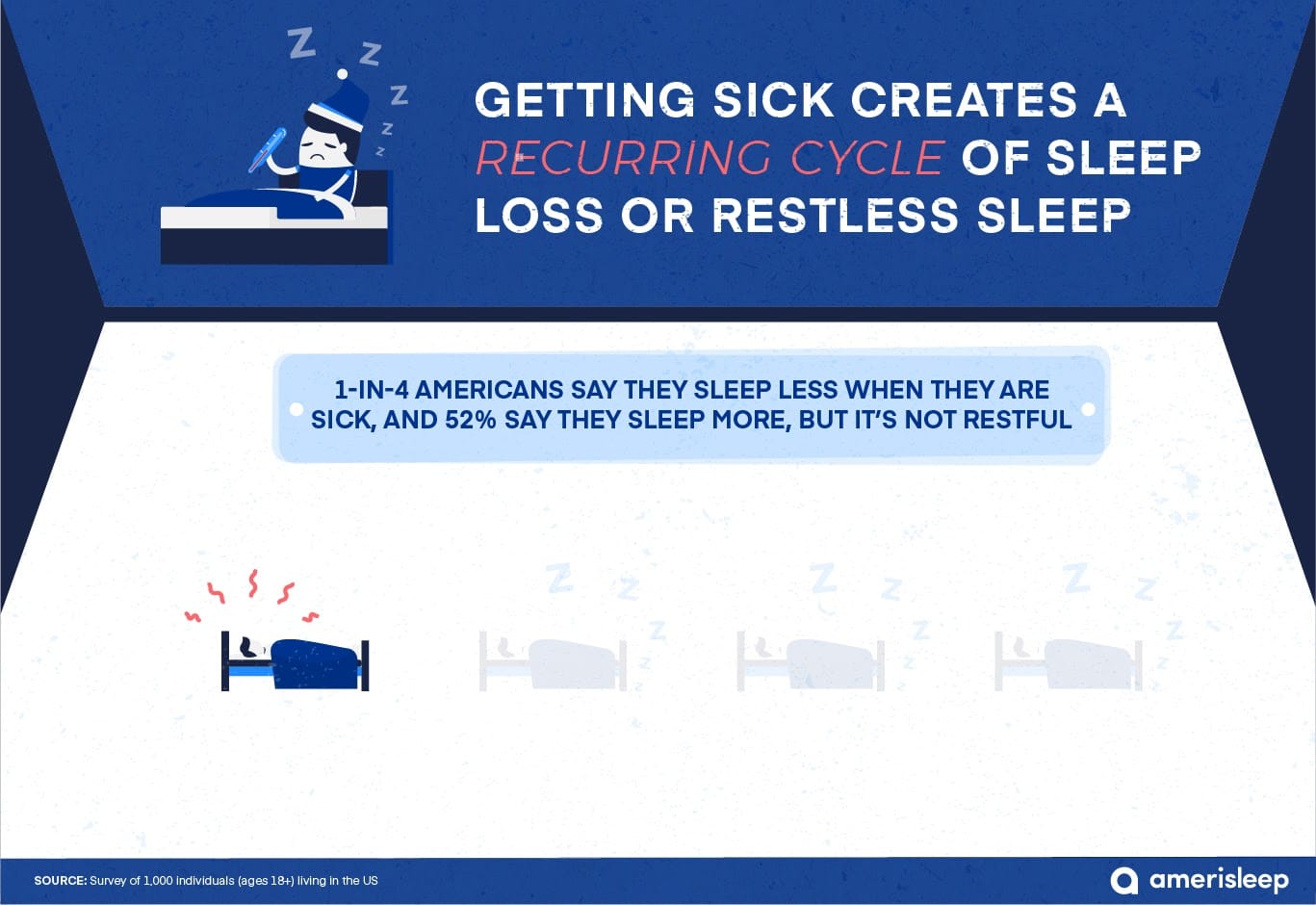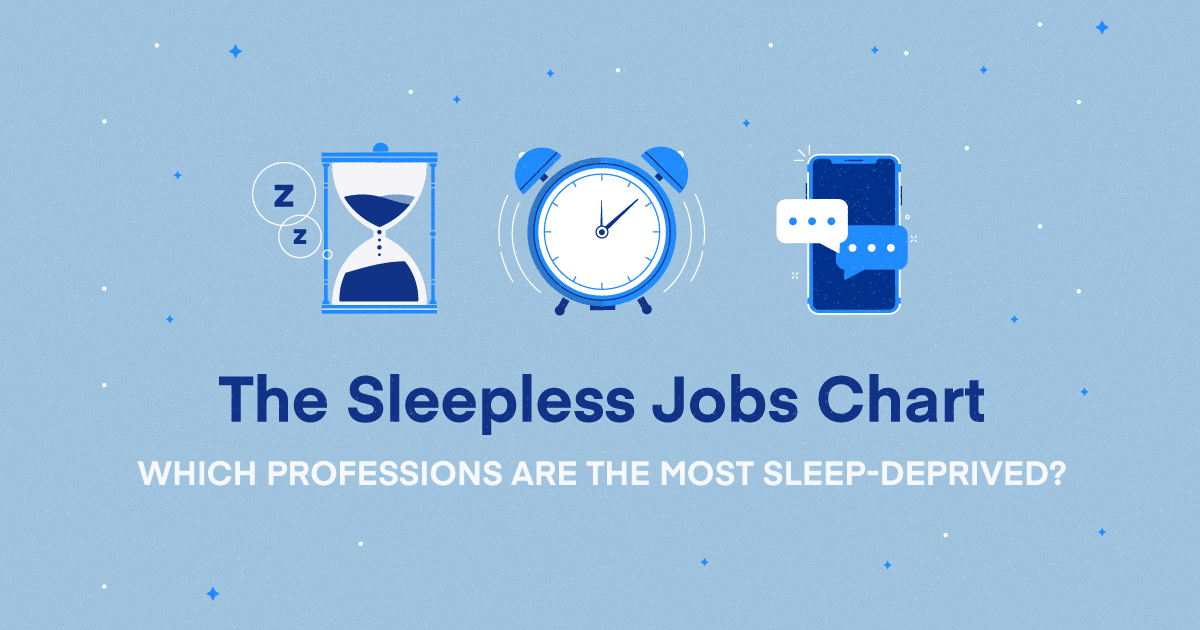For many Americans, winter is an exciting time of the year. A time for vacations, the promise of a new year, and in many locations, weather that turns landscapes into wonderlands.
However, it also brings with it some not so welcomed things, such as the inevitable influx of fever and chills as the flu rears its ugly head. Although the Coronavirus currently has the global headlines, the flu (or influenza as it’s known in medical circles) caused over 647,000 hospitalizations and 61,200 deaths in the U.S. last season. Furthermore, this flu season has caused over 10,000 deaths already. That’s nothing to sneeze at!
Psychology would suggest that recent fear of newer viruses like Corona is due to the underlying enhanced fear of the unknown, but whatever the illness, sleep plays a crucial role in preventing, combatting, and healing.
Sleep, and specifically the lack of it, which often precedes or follows winter bugs, is something many Americans are dealing with right now as well. Due to that, we wanted to see how sleep and the flu season interact. To do so, we surveyed 1,000 individuals (ages 18+) living in the US.
Who is Getting the Sleep They Need to Boost Their Immune Systems?

First, we asked U.S. adults about their sleep patterns to get a baseline view into whether or not they are getting the recommended amount of Zzz’s. Studies show Verified Source Mayo Clinic Ranked #1 hospital by U.S. News & World Report and one of the most trusted medical institutions in the world. The staff is committed to integrated patient care, education, and research. View source that people who don’t get enough quality sleep are more likely to get sick after being exposed to a virus, and when you do get sick, more sleep can lead to a faster recovery. Why is this? When you don’t get the proper amount of sleep, infection-fighting antibodies and cells are reduced, making your bodies battle against the flu a lot harder.
It turns out that most Americans (42%) sleep 5-7 hours per night, with only 38% reporting that they get the recommended 7-8 hours. With the estimated U.S. population of those over 18 hovering around 255 million, that means approximately 158 million Americans aren’t getting the recommended amount of sleep!
When sorting by generations, Gen X was the least likely to get the recommended 7-8 hours of sleep (35.1%), followed closely by Boomers (35.2%). Meanwhile, Gen Z, which still counts some teenagers among its ranks, was the most likely generation (42%) to get the recommended amount of sleep per night.
Given that lack of sleep is associated with a drove of consequences such as an inability to concentrate, mood swings, issues with memory and even more serious issues, including the triggering of manic episodes Verified Source ScienceDirect One of the largest hubs for research studies and has published over 12 million different trusted resources. View source and impact to the microbiota in the gut, Verified Source ScienceDirect One of the largest hubs for research studies and has published over 12 million different trusted resources. View source the fact that more than 60% of the population is not at the recommended threshold is indeed concerning. However, in an age where we are ‘always on’, it’s not entirely surprising.
Lack of Sleep Often Leads to Sickness for 1-in-5 Americans

While the flu can be a highly contagious virus that even the most health-conscious and preventive individuals can pick up, there’s no question that more sleep is better when it comes to staving off this pesky illness.
And this is exactly why 68% of Americans say that lack of sleep at least sometimes leads to them getting sick, and a further 1-in-5 say it’s often the case.
In fact, when we separated those that are chronically sleep-deprived (4 or less hours of sleep per night), we found that they were much more likely to say they already had the flu this season.
Only 16% of respondents that averaged 4-plus hours of sleep per night said they’ve had the flu so far this season, while 31% of those that average less than 4 hours of sleep per night said they’ve had the flu this season.

Weathering the Season With Flu Shots

Overall, 18% of U.S. adults report that they have had the flu already this flu season, with millennials slightly more likely (22%) than the general population to say they’ve already had it since November 2019. While those numbers might seem pretty low, the fact is that the flu season lasts well into spring.
That said, it does appear that Americans are following through with their plans to get the flu shot as a preventative measure this season. A survey by the National Foundation for Infectious Diseases Verified Source National Foundation for Infectious Diseases Nonprofit focused on educating about contagious diseases. View source (NFID) in September of 2019 found that 52% of American adults planned to get a flu shot this flu season.
Our study discovered that 49% of Americans have already followed through with their plans to get a flu shot. This is a positive sign given the flu season usually peaks in February. Verified Source Centers for Disease Control and Prevention (CDC) The United States’ health protection agency that defends against dangers to health and safety. View source However, it’s important to note that the flu shot can take a couple of weeks before it can protect you, so earlier in the season is always better than later in the season to get it.
Money Shouldn’t Buy You the Flu Shot

While overall flu shot use looks on track, when we dug deeper into demographic data on flu shots administered by income levels, we found a pretty big discrepancy between lower and higher-incomes receiving the flu shot. Only 40% of the U.S. population living within households with less than $50,000 in annual income report receiving a flu shot this season. Comparatively, 55% residing in households reporting more than $50,000 income report receiving a flu shot this season.
This isn’t the first time this sort of troubling discrepancy has been found. A prior CDC study Verified Source Centers for Disease Control and Prevention (CDC) The United States’ health protection agency that defends against dangers to health and safety. View source uncovered that in the 2016 to 2017 flu season, 48% of expectant mothers on public insurance (mostly through Medicaid) got the flu vaccine compared with 59% that had private insurance.
If you’re wondering how this is possible, even with some businesses and clinics that offer free vaccines and give a gift card in exchange, the issues go a bit deeper. Many lower-income families don’t live nearby a national chain that is ready to carry flu vaccines. And more commonly, many lower-income households cite fearing missing work or not being able to take off work as a reason they didn’t get a flu shot.
In a day-and-age where you’ll likely experience a long wait in a doctor’s office only to hear that the viral infection found has to ‘run its course,’ these families are also less likely to be proactive with flu symptoms, also due to the inability to miss work.
Getting Sick Creates a Recurring Cycle of Sleep Loss Or Restless Sleep

For those not taking preventative measures like the flu shot, getting sick can lead to a recurring cycle of losing sleep. More than 1-in-4 Americans say they sleep less when they are sick, and 52% say they sleep more, but it’s not restful.
And even if you are among the 24% that try to get more than 8 hours, the 34% that try to get to sleep earlier, or the 19% that add naps to supplement their sleep when they feel the onset of the flu coming on, the fact is that when you’re sick all sleep is not good sleep.
We’ve all been there, tossing and turning throughout the night as a stuffy nose and incessant cough make it impossible to go to or stay asleep. Americans say that these ailments (48% and 35%) respectively are the biggest threat to a good night’s sleep when they’re ill.
And for all the parents out there, a sick child at home can create a vicious lack of sleep cycle that contributes to an illness making the rounds around the house. 52% of our respondents say they sleep less when their child is sick because they wake up to care for them.
How We Prefer to Recover From Being Bedridden

When we are sick, we often find comfort in the little things. Binging our favorite TV shows, eating some yummy, but not so healthy foods, and just finding a cozy spot to hunker down and let our body heal. We wanted to see what people’s preferred go-to comfort items and bedside TLC are when they’re ill.
It turns out that the top go-to comfort item is an extra blanket (44%), followed closely by cozy pajamas and socks (40%). Looking at the results by gender, women’s #1 go-to is cozy pjs and socks (48%), while men’s #1 go-to is an extra blanket (52%).
When it comes to preferred bedside TLC in addition to the cozy add-ons, general respondents were most likely (36%) to say that their preferred TLC is to be left alone with peace, quiet, and hopefully some sleep!
In response to our report’s findings, Amerisleep’s sleep researcher, April Mayer, adds:
“Counting on a restful night’s sleep is vital to a person’s physical and mental health. Good sleep is the simplest solution to preventing illness and can help a body heal faster. It’s interesting to see a disparity in the amount of lower income families not choosing to receive a flu shot, especially given a main concern of missing work. We hope everyone has easy and affordable access to the vaccines they need and a good night’s sleep, and that they never have to worry about the flu.”
To help you get a good night’s sleep and avoid those pesky illnesses, make sure to check out Amerisleep. Using more technology linked to improved sleep than any other brand, our proprietary design and materials will help you unwind and settle in for a night of comfort when you need it most. Visit us at Amerisleep today.
About the author
McKenzie Hyde is a Certified Sleep Science Coach and a full-time writer focused on sleep health and the mattress industry. She currently writes articles on a variety of topics, ranging from sleep hygiene to the newest trends in the mattress and bedding industry. Just some of the topics she has covered include best sleep practices for students, the consequences of going without sleep, and choosing the right bed if you suffer from back pain. McKenzie Hyde holds a Master of Arts degree from Utah State University where she studied literature and writing. While there, she taught argumentative writing and wrote a variety of articles and analyses for literary and academic journals.
View all posts





